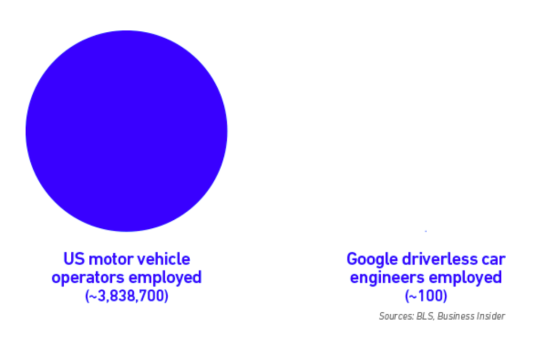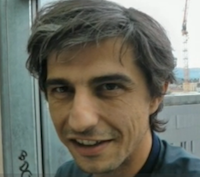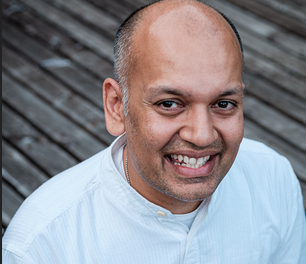Federico Pistono/Founder, CEO Konoz, Author, Futurist
How will they way we work change within the next 10 years? What are the main influences to this change?
Federico Pistono: Look at this image.

It shows the number of people who work on the Google autonomous cars, and the number of people in the US motor vehicle industry. Even if we increase the number of jobs by 2 orders of magnitude (100x), to include competing companies and jobs that will come out of this new innovation, we’re still ~400x short. My main point is this: yes it’s true that new technology will create new jobs. But those are very few, highly paid, and very sophisticated. The vast majority of jobs will be destroyed and not come back.
Given enough time, any industry will look like that picture. What will happen to truck, taxi, and bus drivers tomorrow will also happen to retail stores, hotels, airports, factories, construction sites, lawyers, journalists, nurses, etc. It’s not a question of if, but rather when.
What impact will new ways of education have on our work?
Pistono: We’re already seeing incredible shifts in the way we learn. Hundreds of millions are learning new skills online, by and large for free. I started a company, konoz (http://konozlearning.com) to accelerate that process, by organizing all the world’s free video courses in a single platform, and there are many working towards similar goals.
What are the biggest challenges we have to face?
Pistono: At the social level, the growing inequality and the disappearance of the middle class. A thriving society cannot exist in those conditions.
What are the biggest opportunities for society?
Pistono: Clearly automation and the ubiquitous availability of affordable technology. If we get rid of wage slavery by decoupling income for survival and work, new technology and automation suddenly become welcomed, instead of being feared and opposed. It seems such an obvious conclusion that it baffles me that so many have never considered it.
What is your vision?
Pistono: We have to think strategically about the next decade. Capitalism was clearly effective at achieving certain goals, otherwise it would not have spread to be the dominant economic system on the planet today. But we all see its shortcomings. Any partisan ideology is outdated in the face of exponential change. We need to embrace a more holistic and adaptive system.
The crux will be to solve the growing inequality. I believe experiments with unconditional basic income, coupled with the utilization of cryptocurrencies and blockchain-based technologies will help us find the right answers.
About:
Federico Pistono is social entrepreneur, computer scientist, award-winning journalist, scientific educator, activist, and public speaker. He’s author of the best-selling book “Robots Will Steal Your Job, But That’s OK: How to Survive the Economic Collapse and be Happy” and founder and CEO of konoz (http://konozlearning.com), the first crowdfunding platform for YouTube educators. He holds a BSc in Computer Science from the University of Verona, and in 2012 he graduated from Singularity University, NASA Ames Research Park.






